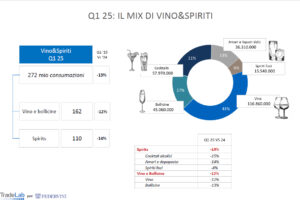The “Welfare Index PMI 2021 - The report on the state of welfare in Italian small and medium-sized enterprises”, promoted by Generali Italia, with the participation of the major confederations, Confindustria, Confagricoltura, Confartigianato, Confprofessioni, Confcommercio and the patronage of the Presidency of the Council of Ministers has indicated the top of the top companies as: the Sicilian farm, Natura Iblea Paniere Bio in Ragusa, especially focused on integrating foreign and local workers as well as employing women; the historic Chianti winery Barone Ricasoli, in Chianti Classico, an avant-garde company that continuously improves integrating Italian and foreign workers at all levels; the Peverelli company in Como, active in managing and designing greenery, which has also invested heavily in the current aspects related to the fight against Covid-19; the Apulia winery, “Produttori di Manduria”, a cooperative that defends the historicity of the sapling vine and the work of 400 small wine artisans and the Baggini company in Pavia, specialized in fruit and vegetable production, which also focuses on employing disadvantaged people.
The survey has indicated that even in the particularly challenging period 2020-2021 for Italian companies in every sector, there has been a quality leap on the corporate welfare level, and growth in companies active in this regard, as well as increasing the sectors involved. 2020 and 2021 were and are still very challenging years for Italian companies that were hit hard by an unprecedented crisis. The reaction to the Pandemic has given, instead, a quality leap to corporate welfare through expanding the number of active companies, increasing the range of initiatives adopted, and above all, generating a new awareness of the social role of companies.
43.8% of the companies have offered prevention and diagnostic services, including swabs and serological tests. Many have expanded health services that were already available or have created new ones: 25.7% have extended insurance coverage, 21.3% have offered remote health services, such as medical or psychological consultation services. The change companies have had to deal with to adapt their work organization by increasing flexibility of working hours and permits (35.8%), as well as the financial commitment in support of employees, was highly significant. 39% of companies have developed training courses in an innovative way, introducing digital solutions. Furthermore, companies have offered contributions to communities and public institutions, including donations (16.4%) and activities in support of the health system or research (9.2%). This effort has permanently changed corporate welfare, since 42.7% of companies that have implemented initiatives in response to the emergency intend to maintain them in the future as well. All of this is within an anything but simple context, plus due to the crisis linked to the pandemic, 51% of companies have suffered considerable losses in volume of business, which in half of the cases (24.7% of the total), have been extremely heavy, exceeding 20% of turnover.
At the level of intervention areas, however, the most respected is “Working conditions and safety”, in which all companies reach at least an average level (determined by the application of contractual rules) and 74.4% reach a high level. In the area of Rights, Diversity and Inclusion, most companies (89.6%) reach the average level, which we could define as compliance, but the gap between these and high-level companies (47.6%) is significant. This area is still evolving and it reflects the change in management cultures and social sensitivity. Therefore, it is clear that corporate welfare is useful, ethical and helps workers. Research shows that business also benefits, at least looking at the financial statements over the last 3 years of 4.772 companies participating in the PMI Welfare Index, analyzed by CERVED, which indicates better profitability levels per employee, the higher the level of welfare. Regarding company results, the one that has the greatest social value is the growing trend in employment. During the period 2017-2019, employment grew on average +7.1%, but the trend was weaker in the segments that had an initial average welfare level (5.7% and 3.4% respectively), and decidedly more robust (12.7%) in companies that had a very high level of welfare.
Copyright © 2000/2025
Contatti: info@winenews.it
Seguici anche su Twitter: @WineNewsIt
Seguici anche su Facebook: @winenewsit
Questo articolo è tratto dall'archivio di WineNews - Tutti i diritti riservati - Copyright © 2000/2025








































































































































































































